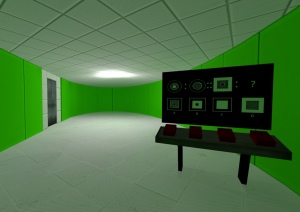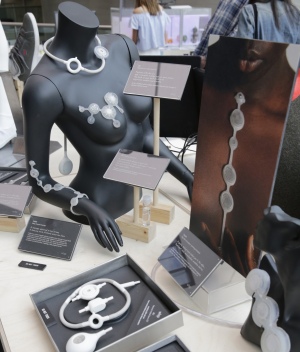The best of student design innovation on display at the annual Imperial Show.
by Jon Narcross

Project LYS - the personal lighting solution
From a smart socket for prosthetic limbs to a collapsible hydroponic farm, the Imperial Show celebrates the best that student design has to offer.
The show, featuring 50 different innovations developed by students on the Innovation Design Engineering (IDE) and Global Innovation Design (GID) courses, is the final display of work from the class of 2016. The courses are run jointly by Imperial’s Dyson School of Design Engineering and the Royal College of Art.
Professor Peter Childs, Head of the Dyson School of Design Engineering said: “Innovation Design Engineering has been running since 1980, and the course now has over 600 graduates. Three years ago we set up a new course, Global Innovation Design, and the show features nine students who are graduating from that course.
“Our programmes aim to make a difference. IDE and GID are about producing a society of tomorrow that’s worthwhile, that has integrity.
“The graduating students displaying here this week have that integrity. Their innovations on show are evidence of a cohort interested in furthering people’s opportunities, furthering our society and furthering our planet.”
With products ranging from artificial intelligence to the latest in digital kitchen equipment to reduce food waste, the innovations covered a range of exciting fields.
Projects on display this week include:
IntroSpec: Find your Spatial DNA
Jon Rasche’s Introspec is a system designed to aid the personalisation of real-world physical space based on a person’s individual psychological preferences.

A virtual IntroSpec testing room
“My initial inspiration came from the question of whether the design of a hospital room can affect a patient’s outcomes,” said Jon.
Using a puzzle game-based platform, IntroSpec observes players as they perform different mental tasks under varying conditions, capturing how they perform and creating a psychological profile for the user. It links the architectural environmental conditions to your different mental states and then compiles it into your unique Spatial DNA.

IntroSpec's Spatial DNA profiles
This Spatial DNA can then be used by architects, designers or employers to find the perfect environmental conditions to foster your individual happiness and performance for any type of activity, as well as find best-fit combinations for an optimum shared workspace.
Jon added: “I think we’re going to be moving away from mass design and into an era of mass customisation. IntroSpec can help customise the physical environment to your individual needs.”
Vochlea
George Phillip Wright’s handheld device – inspired by the shape of sea shells - functions as a microphone that uses the voice of the speaker and maps it onto a range of instruments.

Vochlea
Vochlea maps the melody of the user's voice onto an instrument, which is selected according to the user’s tone. Currently the Vochlea includes drums, guitar, bass and brass, but has the potential to expand further.
The device works with a control panel to allow users to lay down multiple tracks, mix various instruments, and also add effects and distortions.
George designed the system for use at an early stage of creation, as a way to easily lay down initial ideas into music.
"Voice is the main tool to communicate in life but it lacks the rich tonality of music,” George explained. "That's where Vochlea comes in. It's a bit like sketching – architects sketch a building on paper visualising the design, but you can't build it out of paper."
Sharing the wonder

Wisp
Other highlights on show include Wisp, a range of erotic jewellery to help women understand and explore their own sexual arousal, and Vigor, a glove which provides extra strength to children with muscular dystrophy, mild cerebral palsy or related neuromuscular diseases.
The show runs until Friday 8 July 2016 in the College Main Entrance at the South Kensington Campus.
Article text (excluding photos or graphics) © Imperial College London.
Photos and graphics subject to third party copyright used with permission or © Imperial College London.
Reporter
Jon Narcross
Communications and Public Affairs